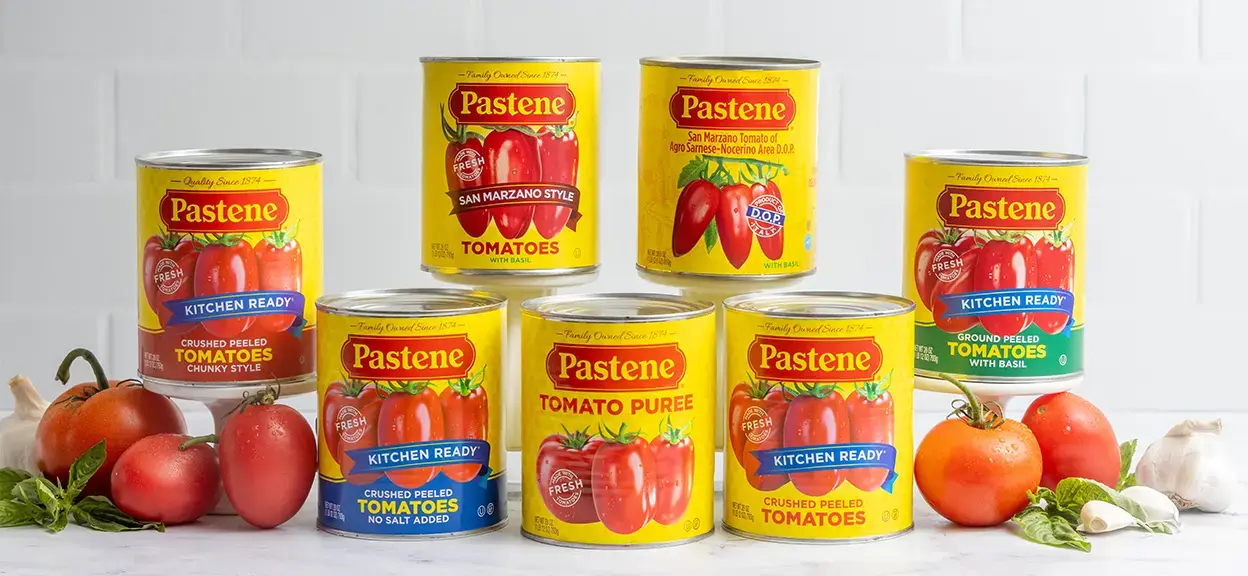Boston Business Journal

Pastene CEO Mark Tosi shares stories of being the sixth generation to lead the Italian food brand in Mass.
The Boston Business Journal interview series Candid Conversations with Forward Thinking Leaders is aone-on-one discussion with interesting and influentiallocal business leaders. Doug Banks, BBJ’s executive editor,had a recent conversation with Mark Tosi, the president andco-owner, with his brother, of Pastene, the country’s oldestimporter of authentic Italian foods and ingredients.For the full interview, and more about Tosi’s background,Pastene’s Prohibition-era sacramental wine distributionbusiness; family-business planning, supply-chain challengesand more, go online atBizj.us/1qgnlm. A short selection from the interview can be found below. The following excerpt has beenlightly edited for brevity and clarity.
Doug Banks: You and your brother, Chris, represent the sixth generation of Pastene at the helm of what is an iconic local brand. Pastene is now approaching its 150th anniversary. You’re headquartered in Canton, but the company began with a produce pushcart in Boston’sNorth End, yes?
Mark Tosi: Yes, Mr. Luigi Pastene came in 1848 and started with a pushcart. Then his son, Pietro, working with his dad, opened the first office on Fulton Street in the North End, and it was a produce company. And as the immigrants came in, there was a great demand for Italian products. But most importantly, olive oil was the first product, and the company grew from there.
Banks: Is it true that Pastene is the oldest specialty company of its kind in the United States?
Tosi: I would say it’s the oldest “privately held.” It’s been in my family for the entire time. There are probably companies as old, but they’re not still a family business.
Banks: How many locations and facilities do you have now? How many employees?
Tosi: Well, we are located in Canton, as you said. We also have an office in Montreal, Canada. So the majority of our business right now is in the Northeast U.S. and Eastern Canada. We employ roughly 100 people and our brand is produced primarily in Italy. Some products are produced in the United States, some in Spain. But most of the products are in Italy.
Banks: I have to be honest — my wife’s tomato sauce is, by far, the best in our extended family since her grandmother passed away 20 years ago. Both of them base their sauce on your Kitchen Ready Tomatoes. I’m sure you hear stories like that all the time.
Tosi: That’s very nice. And we do hear it a lot, because it’s multi-generational, because the recipes are passed down from, you know, grandmothers, great grandmothers, to kids today who, because of Covid, had to learn how to cook again — or to learn for the first time because we couldn’t go out. And the comfort food of Italian food was, and the price point is, good for everyone.
Banks: Did Covid help or hurt Pastene? As you said, comfort foods generally did very well, but Italy was hard, hard hit at the beginning of Covid.
Tosi: Covid actually helped quite a bit. Even though Italy was one of the first countries to be shut down, its commerce did not. And it was amazing how efficient our supply from Italy was — the containers kept moving at a better pace than we possibly could have assumed. Post-Covid, it’s actually slowed down a lot. Our containers can be 30 days or more behind. And the cost of them has gone up exponentially. But we were able to keep our shelves full most of the time.
Banks: Supply chains are continually in the news. How have you been able to manage your supply chain?
Tosi: Right. Most people wouldn’t expect that Ukraine has been a problem, because a great deal of the glass produced for Europe comes from Ukraine — as well as lids. No one would assume glass comes from there. Our supply, generally, has been a big challenge, whether it’s aluminum for cans, glass for our jars — even paper labels — have been difficult, and everything is behind, unfortunately.
Banks: I don’t think people know that prior to the mid1970s, drinkers of Robert Mondavi in New England were getting their wine from you.
Tosi: Well, Pastene had been, as I said, in the wine business for a very long time, well before Prohibition. And even during Prohibition, Pastene was supplying the churches with their sacramental wine. So we go way back, and our wines generally were coming from California. The Mondavi families were friends of ours for a very long time. So when Mr. Robert Mondavi opened his winery, he was very close friends with my father, and we were the first distributor in the U.S. We enjoyed an amazing relationship for a very long time until we decided to focus more on our food than the wine. We sold the wine company in the early 1990s. I do miss that, I admit, but the food business is wonderful. he was very close friends with my father, and we were the first distributor in the U.S. We enjoyed an amazing relationship for a very long time until we decided to focus more on our food than the wine. We sold the wine company in the early 1990s. I do miss that, I admit, but the food business is wonderful. He was very close friends with my father, and we were the first distributor in the U.S. We enjoyed an amazing relationship for a very long time until we decided to focus more on our food than the wine. We sold the wine company in the early 1990s. I do miss that, I admit, but the food business is wonderful.








